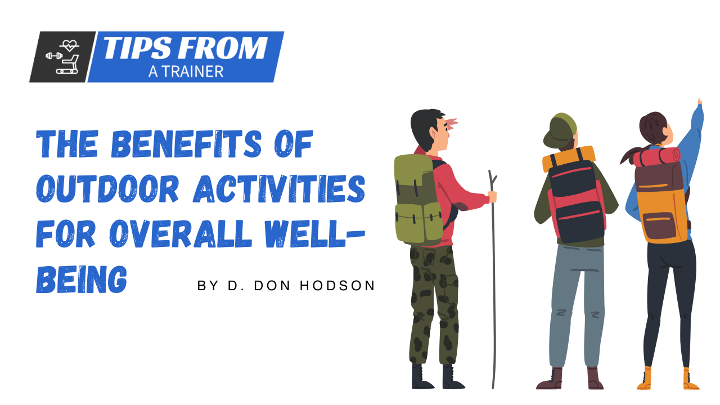Introduction
Nature's Healing Power: The Connection Between Outdoor Activities and Well-being
In a world characterized by modern conveniences and technological advancements, the allure of outdoor activities offers a profound counterbalance. Nature's healing power has been a source of solace and rejuvenation for generations, providing respite from the demands of daily life. The symbiotic relationship between human well-being and the great outdoors is a timeless connection that has garnered increasing attention in contemporary discourse. As we traverse the landscape of outdoor activities, we embark on a journey that encompasses physical vitality, emotional equilibrium, mental clarity, and social cohesion.
The Multifaceted Impact of Outdoor Engagement
The influence of outdoor activities on well-being is far-reaching, transcending individual spheres of health to encompass a holistic tapestry of benefits. The invigorating embrace of fresh air and the symphony of natural sounds engage our senses, prompting a reawakening of the body and mind. Moreover, the multifaceted impact of outdoor engagement extends beyond the individual, nurturing social bonds and fostering a sense of connection with the environment. As we delve into the realm of outdoor pursuits, it becomes evident that their effects ripple outward, touching every facet of our existence.
Purpose of the Article
This article is poised to unravel the intricate relationship between outdoor activities and well-being, offering a comprehensive exploration of their manifold advantages. From the physical benefits that invigorate our bodies to the cognitive and emotional enhancements that fortify our minds, each section delves into a distinct facet of this transformative journey. By delving into the rich tapestry of outdoor engagement, we endeavor to illuminate the path toward a more enriched and balanced way of life, one that embraces the profound healing power of nature.
Table of Contents
Introduction
Nature's Healing Power: The Connection Between Outdoor Activities and Well-being
The Multifaceted Impact of Outdoor Engagement
Purpose of the Article: An In-depth Exploration of Outdoor Activities and Their Benefits
The Physical Benefits of Outdoor Activities
Cardiovascular Health: Breathing Fresh Air and Strengthening the Heart
Boosting Immune Function and Vitamin D Absorption
Enhancing Muscle Strength, Flexibility, and Balance
Mental and Emotional Well-being
The Therapeutic Effect of Nature on Stress Reduction
Mood Elevation and Reduction of Anxiety
Cognitive Restoration and Improved Focus
Social Connections and Community
Opportunities for Meaningful Social Interactions
Building Stronger Relationships and Bonds
Fostering a Sense of Belonging and Inclusion
Connecting with Nature and Mindfulness
Deepening the Bond with the Natural World
Practicing Mindfulness and Present-Moment Awareness
Nature's Role in Promoting Mental Clarity and Spiritual Renewal
Outdoor Activities as Exercise and Recreation
Exploring Various Outdoor Activities: Hiking, Cycling, Swimming, and More
Fitness Benefits of Outdoor Exercise
Combining Fun and Fitness: Engaging in Recreational Outdoor Pursuits
Environmental Awareness and Stewardship
Cultivating Environmental Consciousness
Education and Eco-Literacy Through Outdoor Engagement
Nurturing a Sense of Responsibility and Conservation
Incorporating Outdoor Activities into Everyday Life
Overcoming Barriers to Outdoor Engagement
Integrating Nature into Urban Environments
Sustaining a Lifelong Connection with Outdoor Well-being
Conclusion
Embracing the Great Outdoors: A Holistic Path to Enhanced Well-being
The Ongoing Journey: Nurturing Health, Joy, and Vitality Through Outdoor Activities

The Physical Benefits of Outdoor Activities
Cardiovascular Health: Breathing Fresh Air and Strengthening the Heart
The rhythmic cadence of footsteps on natural terrain, coupled with the inhalation of crisp, unpolluted air, fuels a symbiotic relationship between outdoor activities and cardiovascular health. Engaging in activities such as brisk walking, jogging, or cycling amidst natural surroundings elevates heart rate, enhancing circulation and promoting efficient oxygen exchange. This aerobic exertion bolsters the heart muscle, augments blood vessel elasticity, and fortifies the cardiovascular system's ability to deliver oxygen-rich blood throughout the body. As the heart responds to the demands of outdoor pursuits, its endurance and efficiency amplify, underscoring the vital role of nature in nurturing cardiac wellness.
Boosting Immune Function and Vitamin D Absorption
The sun's radiant embrace bestows a dual gift upon outdoor enthusiasts: a surge of vitamin D synthesis and a bolstered immune system. The skin's interaction with sunlight triggers the production of vitamin D, a crucial nutrient that supports immune function, bone health, and a myriad of physiological processes. Time spent outdoors allows the body to harness this natural source of vitality, fostering immune resilience and enhancing disease resistance. Moreover, outdoor activities serve as a sanctuary for immune cells, which thrive in the presence of fresh air and natural elements, heightening the body's ability to combat pathogens.
Enhancing Muscle Strength, Flexibility, and Balance
Outdoor activities stand as a dynamic conduit for cultivating musculoskeletal health and functional fitness. Hiking through undulating terrains, kayaking across serene waters, and scaling rocky cliffs engage a diverse array of muscle groups, fostering strength, flexibility, and balance. The inherent variability of outdoor environments necessitates adaptability, challenging the body to navigate through ever-changing topographies. This engagement with nature nurtures not only physical prowess but also cultivates a resilient musculoskeletal framework that bolsters daily activities and prevents injury.
Mental and Emotional Well-being
The Therapeutic Effect of Nature on Stress Reduction
Amid the bustling pace of modern life, nature stands as an oasis of tranquility and respite. The soothing symphony of rustling leaves, the gentle murmur of flowing water, and the vast expanse of open sky create an environment that induces relaxation and mitigates stress. Exposure to natural settings triggers a cascade of physiological responses that counteract the body's stress response, reducing cortisol levels and promoting a sense of calm. Immersed in nature's embrace, the mind finds solace, allowing worries to dissipate and mental tension to give way to serenity.
Mood Elevation and Reduction of Anxiety
The profound influence of outdoor activities on mood elevation is underscored by the release of endorphins, often referred to as "feel-good" hormones. The rhythmic cadence of walking, the invigorating rush of cycling, or the rhythmic strokes of swimming engender a surge in endorphin production, fostering a sense of euphoria and well-being. Furthermore, the immersion in natural environments activates the parasympathetic nervous system, promoting relaxation and diminishing anxiety. As outdoor activities unfold against a backdrop of nature's beauty, the mind finds reprieve from the incessant demands of daily life.
Cognitive Restoration and Improved Focus
In an era characterized by digital distractions and cognitive overload, nature emerges as a catalyst for cognitive restoration. The natural environment, devoid of the persistent stimuli of screens and gadgets, offers a canvas of simplicity that rejuvenates cognitive faculties. Time spent outdoors fosters directed attention, allowing mental resources to be allocated more effectively. This revitalization of cognitive function bolsters focus, problem-solving abilities, and creative thinking. Whether meandering through a forest or gazing at the expanse of a serene lake, the mind is revitalized and imbued with renewed clarity.
Social Connections and Community
Opportunities for Meaningful Social Interactions
Outdoor activities provide a fertile ground for the cultivation of meaningful social interactions. Whether embarking on a group hike, participating in team sports, or engaging in community gardening, these endeavors facilitate interpersonal connections grounded in shared experiences. The absence of technological distractions nurtures genuine face-to-face interactions, enabling individuals to forge bonds that transcend virtual confines. The camaraderie that blossoms amid the splendor of nature fosters a sense of belonging, amplifying the joys of human connection.
Building Stronger Relationships and Bonds
Participating in outdoor activities with friends, family, or acquaintances nurtures the strengthening of existing relationships. Collaborative engagement in nature-based pursuits fosters cooperation, communication, and a deepening sense of mutual support. Shared accomplishments, such as reaching a summit or completing a challenging trail, solidify emotional bonds, laying the foundation for lasting connections. As individuals overcome obstacles together and celebrate triumphs in the great outdoors, the fabric of their relationships is woven with threads of resilience and shared achievement.
Fostering a Sense of Belonging and Inclusion
Outdoor communities offer fertile soil for fostering a profound sense of belonging and inclusion. In these spaces, individuals with shared interests unite, transcending cultural, social, and economic boundaries. The collaborative spirit that permeates outdoor communities serves as a powerful antidote to feelings of isolation and disconnection. Whether gathered around a campfire, tending to a community garden, or participating in conservation efforts, the sense of unity nurtured by outdoor engagement reinforces a collective identity rooted in a shared reverence for nature.
Connecting with Nature and Mindfulness
Deepening the Bond with the Natural World
The human spirit finds solace and inspiration in the embrace of the natural world. Outdoor activities offer a gateway to deepening our connection with nature, allowing us to forge an intimate bond that transcends the ordinary. As we wander through lush forests, traverse rolling meadows, or stand in awe before majestic mountains, we tap into an innate affinity for the Earth's beauty and vitality. This connection instills a sense of wonder and reverence, fostering a profound understanding of our place within the intricate web of life.
Practicing Mindfulness and Present-Moment Awareness
The practice of mindfulness, rooted in ancient traditions, finds a fertile ground in outdoor activities. Amid the rustling leaves and babbling brooks, the mind attunes itself to the rhythm of nature, grounding us in the present moment. Mindfulness in nature involves engaging the senses fully, from the touch of a cool breeze on the skin to the melodies of chirping birds. This immersion sharpens our awareness, allowing us to let go of distractions and cultivate a state of profound presence. In the sanctuary of nature, we find an optimal environment for nurturing mindfulness and fostering a sense of calm clarity.
Nature's Role in Promoting Mental Clarity and Spiritual Renewal
Nature serves as a wellspring of mental clarity and spiritual renewal. The uncluttered expanse of natural landscapes mirrors the openness of our inner landscape, offering a canvas upon which we can reflect and contemplate. Engaging in outdoor activities provides a sanctuary for introspection and self-discovery. It encourages us to detach from the complexities of daily life and immerse ourselves in the simplicity and harmony of the natural world. In these moments of solitude, we often find insights that lead to personal growth and renewal, deepening our understanding of ourselves and the world around us.
Outdoor Activities as Exercise and Recreation
Exploring Various Outdoor Activities: Hiking, Cycling, Swimming, and More
The realm of outdoor activities encompasses a rich tapestry of possibilities, each offering a unique avenue for physical well-being. Hiking leads us through diverse terrains, engaging the legs and cardiovascular system while treating us to stunning vistas. Cycling, whether on paved roads or rugged trails, propels us forward with the power of our muscles, invigorating the heart and lungs. Taking to the water for swimming or kayaking provides a full-body workout that simultaneously cools and rejuvenates. These activities, among others, invite us to embrace the outdoors and infuse our lives with a sense of adventure.
Fitness Benefits of Outdoor Exercise
Outdoor exercise, beyond its recreational allure, bestows a multitude of fitness benefits. The body, when engaged in outdoor activities, undergoes dynamic physical challenges that enhance cardiovascular endurance, muscular strength, and flexibility. The rhythmic engagement of muscles during activities like hiking or jogging stimulates blood flow, enhancing the efficiency of the heart and oxygenating tissues. Additionally, outdoor terrain often introduces natural variations in elevation and resistance, leading to a more holistic workout that targets multiple muscle groups and promotes balance and coordination.
Combining Fun and Fitness: Engaging in Recreational Outdoor Pursuits
The integration of recreation and exercise in outdoor activities exemplifies the harmony between physical exertion and enjoyment. Unlike the monotony of indoor gym routines, outdoor pursuits offer an ever-changing backdrop that keeps the mind engaged and the spirit invigorated. Engaging in activities such as team sports, rock climbing, or even dancing in a park not only elevates heart rates and improves stamina but also envelops the experience in an aura of camaraderie and delight. This alignment of physical exertion and enjoyment not only fosters a more active lifestyle but also amplifies the benefits of exercise.
Environmental Awareness and Stewardship
Cultivating Environmental Consciousness
Engaging in outdoor activities not only enriches our personal well-being but also fosters a profound connection to the environment. The more time we spend in natural settings, the more attuned we become to the delicate balance of ecosystems. Observing the intricate web of life, from the smallest insect to the grandest trees, ignites a sense of wonder and appreciation for the Earth's biodiversity. This heightened awareness, in turn, cultivates environmental consciousness—an understanding of the importance of preserving and protecting the natural world for current and future generations.
Education and Eco-Literacy Through Outdoor Engagement
Outdoor activities provide a living classroom for learning about ecology, conservation, and sustainability. As we explore forests, wetlands, and oceans, we gain firsthand insights into the interdependence of species and the delicate ecosystems that sustain life. This experiential education deepens our eco-literacy, empowering us with the knowledge needed to make informed decisions about environmental issues. Through guided nature walks, educational programs, and experiential learning, outdoor engagement becomes a vehicle for spreading environmental awareness and inspiring positive change.
Nurturing a Sense of Responsibility and Conservation
The bond formed between individuals and the environment often evolves into a sense of responsibility and stewardship. Outdoor enthusiasts, having witnessed the beauty and fragility of nature, feel compelled to take action. This may involve participating in conservation efforts, volunteering for habitat restoration projects, or advocating for policies that safeguard natural resources. The act of tending to the environment becomes an extension of self-care, as the well-being of ecosystems becomes intertwined with our own well-being. This sense of responsibility creates a ripple effect, inspiring communities to unite in the shared goal of protecting the planet.
Incorporating Outdoor Activities into Everyday Life
Overcoming Barriers to Outdoor Engagement
While the benefits of outdoor activities are evident, modern lifestyles can present obstacles to regular engagement. Time constraints, work commitments, and weather fluctuations may deter individuals from venturing outdoors. Overcoming these barriers requires a proactive approach, such as prioritizing outdoor breaks during the workday, planning weekend excursions, or integrating family-friendly outdoor activities into daily routines. By recognizing the barriers and seeking creative solutions, individuals can pave the way for a more active and nature-rich lifestyle.
Integrating Nature into Urban Environments
Urban dwellers need not be disconnected from the natural world. Even in bustling cities, opportunities abound to engage with nature. Parks, green spaces, and community gardens offer oases of tranquility for relaxation and outdoor activities. Urban planners and designers play a crucial role in incorporating nature into cityscapes, creating pedestrian-friendly spaces, and preserving urban biodiversity. Initiatives such as rooftop gardens, urban farms, and pocket parks contribute to the integration of nature into the fabric of urban living, enabling residents to experience the benefits of outdoor engagement close to home.
Sustaining a Lifelong Connection with Outdoor Well-being
Cultivating a lifelong relationship with outdoor activities requires a shift in mindset—an acknowledgment that the pursuit of well-being extends beyond sporadic moments of leisure. Embracing the outdoors as an essential component of daily life entails setting achievable goals, nurturing a sense of curiosity, and seeking diverse outdoor experiences. This enduring commitment to outdoor engagement contributes to sustained physical health, emotional balance, and a strengthened connection to the natural world. Just as nature evolves through seasons, individuals too evolve in their relationship with the outdoors, finding new avenues for growth and self-discovery.
Conclusion
Embracing the Great Outdoors: A Holistic Path to Enhanced Well-being
In a world characterized by constant change and technological advancements, the innate connection between humans and the natural world remains unwavering. The exploration of outdoor activities emerges as a holistic journey that enriches physical vitality, nurtures emotional resilience, fosters social bonds, and deepens our understanding of the environment. From the rejuvenating embrace of forests to the invigorating energy of outdoor exercise, the outdoors offers a sanctuary where well-being thrives on multiple dimensions.
The Ongoing Journey: Nurturing Health, Joy, and Vitality Through Outdoor Activities
As this exploration draws to a close, it is but a beginning—a prelude to the ongoing journey that awaits each individual who steps outside and embraces the beauty and vitality of the natural world. The holistic benefits of outdoor activities stand as a testament to the symbiotic relationship between humans and nature. By nurturing this relationship, we embark on a lifelong path of health, joy, and vitality—a journey enriched by the great outdoors.

Don Hodson, Certified Personal Trainer
I'm Don, an ACE-certified personal trainer and the founder of Tips From A Trainer. With my passion for fitness and years of experience, I've helped countless individuals transform their physiques!
Having personally overcome weight challenges throughout my life, I understand the struggle. Through consistency, exercise, and a balanced diet, I have managed to stay in shape and I want to share my message with the world!
The fitness industry is fraught with misconceptions and deceptive practices, which is why I am committed to providing you with the truth.
- My Site: www.Don-Hodson.com
- My Company: www.ConnectedAgeMarketing.com

The Benefits of Outdoor Activities for Overall Well-being